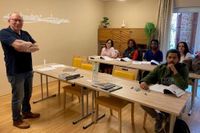The recent Bildungsministerkonferenz (Education Ministers Conference) on March 21, 2025, brought to light two critical discussions surrounding the education system in Germany: the necessity of mandatory language tests for schoolchildren and the regulation of smartphone usage in classrooms. Conference president Simone Oldenburg, along with various education ministers, emphasized the pivotal role of early diagnostic measures to support children's language development.
During the conference, experts recommended establishing diagnostic procedures that would allow educators to assess the language proficiency of children and adolescents. This initiative aims to make informed decisions about language education and better address the discrepancies in language skills. According to Oldenburg, these recommendations contain essential suggestions for implementing diagnostic assessments in schools which will help educators focus on individual student needs based on their existing German language skills.
Oldenburg stated, "The aim is to prepare the findings for everyday school use," underscoring the importance of practical applications for diagnostic findings in the classroom. A specialist conference is scheduled for early June 2025, where these insights will be further developed to ensure teachers can implement them effectively.
Regionally, Bavaria has taken a significant step by introducing a system of mandatory language tests for all children before they start elementary school. Known as the "verbindliche Sprachstandserhebungen," these tests last approximately 30 minutes and are aimed at identifying children who need additional support. If a child does not pass the assessment, they will be required to attend a preparatory course at a state-funded kindergarten.
Anna Stolz, the Bavarian Education Minister, emphasized that these measures focus on enabling participation for all children. "It is a matter of enabling participation," she said, highlighting the importance of ensuring that every child is equipped with the necessary skills to succeed in their educational journey.
The conference also touched on another pressing issue—regulating smartphone use in schools—a subject that was not part of the official agenda but emerged during an informal discussion. Klaus Zierer, a professor of school pedagogy at the University of Augsburg, advocates for stronger measures regarding smartphone regulations in classrooms. He considers the acknowledgment of this issue to be a positive sign, stating, "It must be understood that this is a topic we need to address." Zierer expressed confidence that, under the pressure from scientific communities and educational authorities, the topic will soon be formally addressed in upcoming conferences.
There is currently a general ban on private cell phone usage in Bavarian schools, in line with Article 56 of the Bavarian Education Act. Under this regulation, the use of mobile devices is restricted on school premises unless supervised by a teacher. Stolz strongly supports this approach, stating, "I want children and adolescents to talk to each other on the playground, to exchange ideas, and to make eye contact." This stance showcases the benefits of fostering direct communication among students.
Additionally, the Lehrerverband (Teachers' Association) has voiced strong support for a unified approach to language testing and aligned educational strategies. President Stefan Düll stated, "A complete smartphone ban does not help if the rest of society is glued to their devices," emphasizing the necessity for positive role models in digital device usage. He argued that children need guidance on effectively managing their technology use both inside and outside of school.
Looking ahead, the Lehrerverband is calling for a substantial increase in funding under the Digitalpakt 2.0, aiming for a doubling of the current provisions from five to ten billion euros by 2030. Düll explained that the request is rooted in the necessity for substantial investment in educational resources to improve the teaching environment and the tools available for teachers and students alike.
In conclusion, the discussions at the Bildungsministerkonferenz reflect a nuanced approach to addressing educational challenges in Germany. From mandatory language testing to smartphone regulations, stakeholders are recognizing the need for comprehensive strategies that promote educational equity and prepare children for success in an increasingly complex world. Each initiative aims to create a better learning environment for all students, ensuring they have the necessary support and resources throughout their educational journey.


